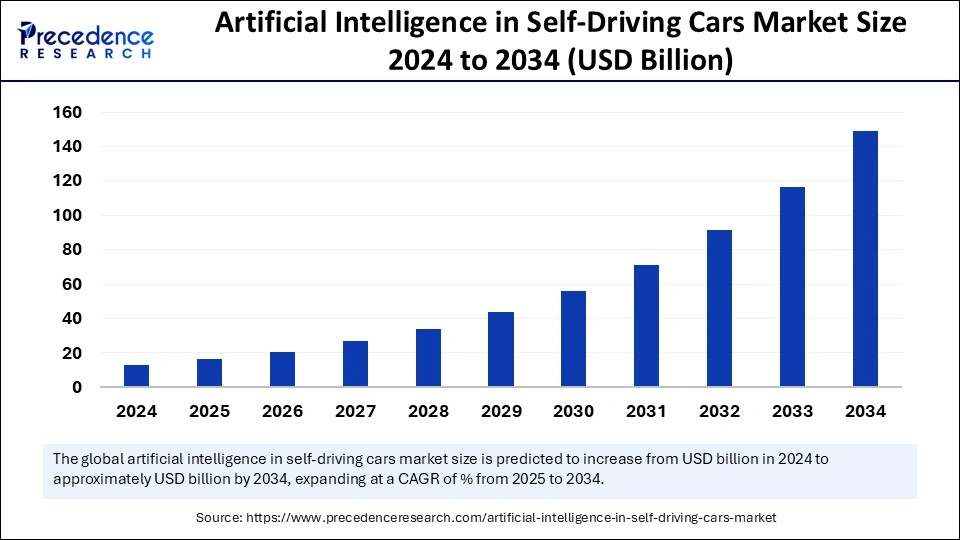
Artificial Intelligence in Self-Driving Cars Market Key Takeaways
- North America led the global artificial intelligence in self-driving cars market in 2024.
- Asia Pacific is estimated to expand at the fastest CAGR between 2025 and 2034.
- By vehicle type, the passenger vehicles segment captured the largest market share in 2024.
- By vehicle type, the commercial vehicles segment is expected to expand at a significant CAGR over the projection period.
- By application, the driver assistance systems segment captured the largest market share in 2024.
- By application, the autonomous navigation segment is expected to expand at the fastest CAGR during the forecast period.
Market Overview
Artificial intelligence in self-driving cars is revolutionizing the automotive industry. AI technology enables autonomous vehicles to process data from their surroundings, make decisions, and navigate roads without human intervention. As advancements in machine learning, computer vision, and sensor technology continue, AI plays a pivotal role in improving the safety, efficiency, and overall functionality of self-driving cars.
The major automotive companies and tech giants investing heavily in AI, the market for artificial intelligence in self-driving cars is expected to grow rapidly in the coming years, contributing to the development of safer and more intelligent transportation systems.
Drivers
Several factors are driving the adoption of artificial intelligence in self-driving cars. First, the need for safer roads and reduced traffic accidents is a major motivation. Autonomous vehicles powered by AI can potentially eliminate human error, which is a leading cause of traffic accidents.
Additionally, the demand for efficient transportation solutions in urban areas, where traffic congestion is a significant problem, is pushing the growth of self-driving cars. The rising interest in electric vehicles (EVs) and sustainable transport is another driver, as AI can help optimize energy consumption and driving patterns in electric autonomous vehicles.
Opportunities
Artificial intelligence in self-driving cars presents numerous opportunities for innovation. One of the key opportunities lies in the development of AI algorithms that can improve vehicle decision-making in complex environments, such as in dense urban traffic or adverse weather conditions. AI can also enhance the overall user experience by enabling features like personalized driving behavior and advanced driver-assistance systems (ADAS).
The integration of AI with 5G technology and IoT can create smarter, connected ecosystems that improve vehicle-to-vehicle communication, real-time traffic management, and remote diagnostics. Furthermore, the ongoing advancements in AI have the potential to drastically reduce vehicle costs over time by automating production processes and enhancing supply chain management.
Challenges
While the potential for artificial intelligence in self-driving cars is vast, several challenges need to be addressed for widespread adoption. One of the major obstacles is the need for highly accurate and reliable AI systems that can handle all driving scenarios safely. Current AI technology still faces limitations in recognizing complex, unpredictable human behaviors on the road. Additionally, legal and regulatory frameworks surrounding autonomous vehicles remain unclear in many regions, complicating the deployment of self-driving cars.
Public perception and trust are also significant barriers, as many people remain skeptical about the safety and reliability of AI-driven vehicles. Lastly, the development and deployment of AI in self-driving cars require substantial investment in infrastructure, including sensors, cameras, and connectivity systems.
Regional Insights
The adoption of artificial intelligence in self-driving cars varies significantly across different regions. North America, particularly the United States, is at the forefront of AI integration in autonomous vehicles, with major tech companies and automakers leading the charge in research and development. The U.S. has established a relatively favorable regulatory environment for autonomous vehicle testing and deployment.
In Europe, while there is strong interest in self-driving technology, regulatory hurdles and safety concerns have slowed its progress. Meanwhile, in Asia, countries like China and Japan are investing heavily in AI-driven autonomous vehicles, with China emerging as a major player in the global market due to its large-scale automotive industry and government support for innovation in transportation technologies.
Recent Developments
Recent developments in artificial intelligence for self-driving cars have seen notable breakthroughs in AI-powered sensors, machine learning algorithms, and deep learning techniques. Companies like Waymo, Tesla, and Baidu have made significant strides in creating more advanced AI systems for autonomous driving. New AI-based technologies are enhancing vehicle recognition, real-time decision-making, and route optimization.
Furthermore, collaborations between tech firms and traditional automotive manufacturers are accelerating the deployment of AI-powered autonomous vehicles. Advances in ethical AI and safety protocols are also being prioritized, ensuring that AI systems can make morally sound decisions while prioritizing human safety.
Artificial Intelligence in Self-driving Cars Market Companies
- Apple Inc.
- Aptiv PLC
- Aurora Innovation, Inc.
- Baidu, Inc.
- BMW Group
- Ford Motor Company (Argo AI)
- General Motors (Cruise)
- Mobileye (Intel Corporation)
- NVIDIA Corporation
- Tesla, Inc.
- Toyota Motor Corporation (Toyota Research Institute)
- Uber Technologies, Inc.
- Volkswagen Group (Autonomous Driving Program)
- Waymo (Alphabet Inc.)
- Zoox (Amazon)
Segments Covered in the Report
By Vehicle Type
- Passenger Vehicles
- Commercial Vehicles
- Shuttle Services
By Application
- Autonomous Navigation
- Driver Assistance Systems
- Telematics and Fleet Management
- Traffic Management and Infrastructure
By Region
- North America
- Europe
- Asia Pacific
- Latin America
- Middle East and Africa
